Dentures Greensboro
Get Your Confidence Back with New Teeth

Are you missing most of your teeth or parts of your smile? Dr. David M. Fisher, Jr. offers various denture options to give you a restoration that will best meet your needs. He is experienced in creating prosthetics that mimic the appearance of natural teeth for a beautiful smile. These custom-made dentures can not only restore your smile, but they can also restore your confidence. Read on to learn more about dentures in Greensboro and how they can improve your day-to-day life.
Why Choose Dr. David M. Fisher, Jr. for Dentures?
- High-Quality, Detail-Oriented Care
- State-of-the-Art, Innovative Technologies
- Experienced, Friendly Dental Team
Types of Dentures
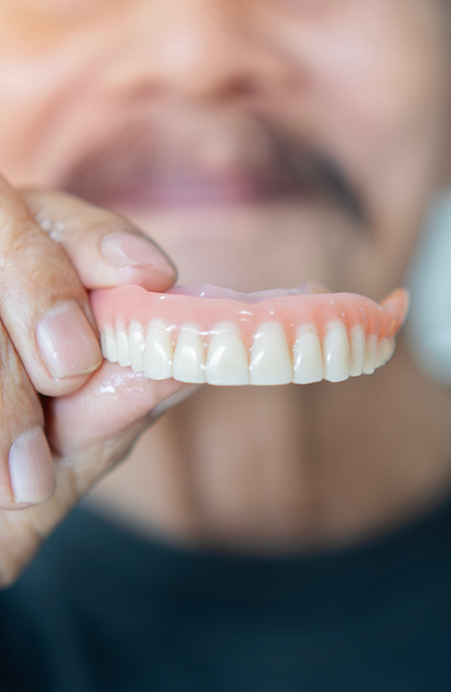
We have various options for dentures to fit your unique needs. After a consultation, Dr. Fisher will provide you with a recommendation that will work best for your smile goals. We offer dentures to replace all or parts of your smile, depending on the number of teeth that you’re missing.
Partial Dentures
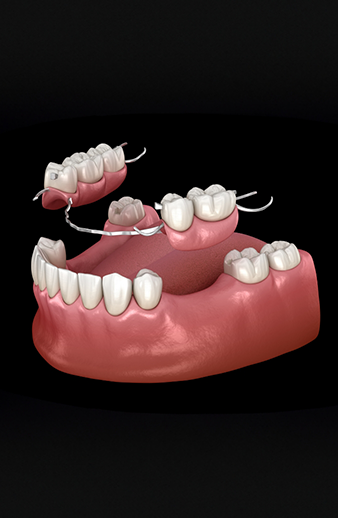
Partial dentures (which are sometimes just called partials) are made of multiple teeth that have been strategically placed on a gum-colored base so that they can fit inside the gaps in your mouth. Partials can replace multiple teeth in a row like bridges, but they’re removable and are normally secured with metal clips or brackets instead of resting on abutment teeth.
Full Dentures
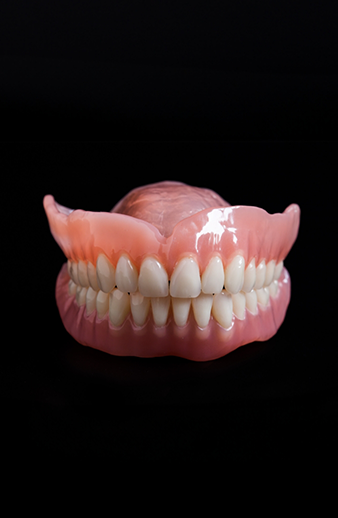
You’ll receive a full denture whenever you’ve lost an entire arch of teeth. The gum-colored base can be a closed palate when it’s designed for the upper jaw, but it can also be shaped like a horseshoe if it’s replacing the lower teeth instead. Traditionally, full dentures sit directly in the gums and use suction to stay in place.
Implant-Supported Dentures
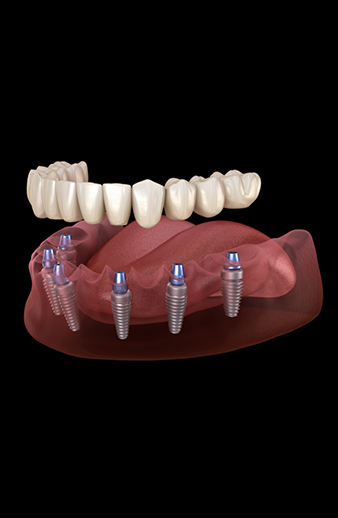
Placing small titanium posts called dental implants into your jawbone will give partials and full dentures sturdy new roots to rest on. You’ll need to wait a few months after the surgery to receive your permanent new teeth, but the results will be worth it; you will be able to eat all of your favorite meals again and will not have to worry about slippage or bone loss.
Who’s a Good Candidate for Dentures?

Whether you’re missing some or all of your pearly whites, you’ll be happy to hear that nearly everyone is potentially a good candidate for dentures! Dentures are one of the most versatile tooth-restoration options around and can provide particularly beautiful and functional results. Even if you’re not immediately eligible for them, Dr. Fisher, Jr. can work with you to restore your oral health to the point where dentures become a viable option!
Effects of Missing Teeth
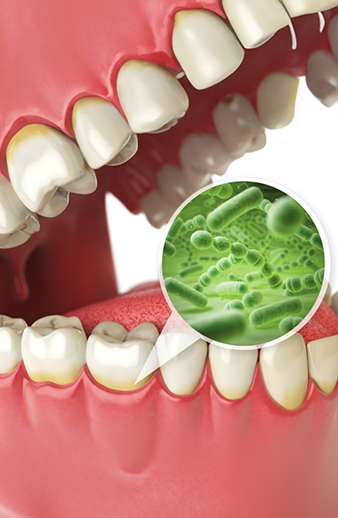
One of the biggest issues relating to missing teeth is the likelihood of additional teeth falling out! If you have gaps in your smile, the remaining natural teeth adjacent to these spaces can begin to lean toward them and eventually fall out themselves, starting an unfavorable chain reaction of additional tooth loss. Without professional assistance and effective replacement teeth, this process is pretty much irreversible.
Another huge issue is the effect this has on your jawbone; your jaw can begin to deteriorate due to the lack of stimulation that your natural teeth normally provide. This will cause the bone tissue to weaken, further increasing the risk of tooth loss! You might also experience complications like facial sagging, difficulty eating, and reduced self-esteem.
What’s worse is that this tooth loss is very preventable; according to the American College of Prosthodontists, some of the most common causes of missing teeth are things like gum disease, dental decay, and other problems that can progress rapidly—all of which result from poor oral hygiene!
What Qualifies You for Dentures?

You’ll be happy to hear that the majority of patients who suffer from extensive tooth loss are qualifying candidates for dentures, though there are a few exceptions. You’ll need to be in excellent oral health and have healthy gums, as they’ll be supporting the prosthetics. You’ll also need to have sufficient jawbone density.
When you visit us for a consultation, we’ll determine which type of denture (partial, full, or implant-retained) is best suited for your needs. Regardless of the type that you’re outfitted with, you’ll need to commit to caring for your smile and dentures alike moving forward to ensure optimal beauty and comfort, as well as serviceable functionality.
Alternative Tooth-Replacement Options
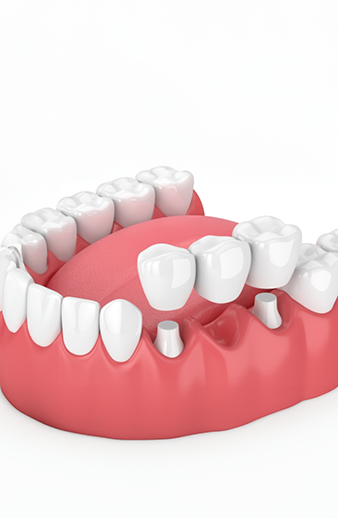
Dental technology continues to evolve at an impressive rate, and various alternatives to dentures don’t just replace lost teeth but also grant patients access to awesome benefits. Here’s a little more about a couple of other tooth-replacement solutions we offer:
- Fixed Dental bridges – These are best for patients only missing one or a few teeth. The bridge requires healthy adjacent teeth surrounding the gap to remain supported. They’re quite strong, look natural, and are very easy to care for!
- Dental implants – These restorations consist of titanium posts that are directly embedded into the jawbone for outstanding and unmatched support. They require a patient to have sufficient bone density and optimal oral health but can last for virtually a lifetime and require no specialized maintenance.
Learn More About Fixed Dental Bridges
Learn More About Dental Implants
How Dentures Are Made
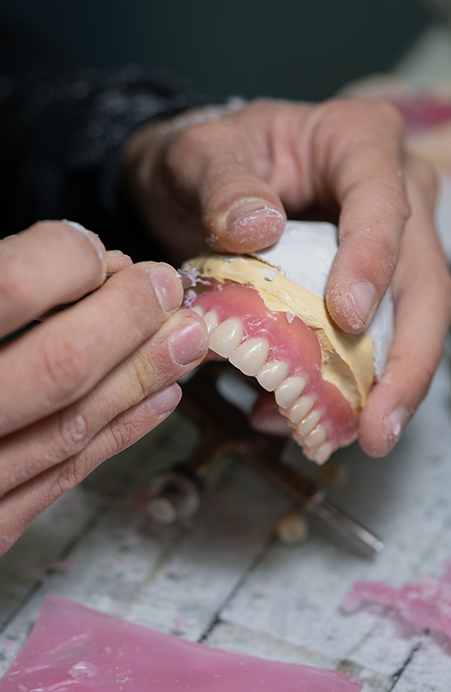
Dentures are a great solution for those who have experienced extensive tooth loss. If you’ve decided that dentures are ideal for you, you may be curious about their creation process. This way, you can appreciate your new smile that much more! Whether you are getting a partial or full denture, here is what you can generally expect.
What Are Dentures Made Of?
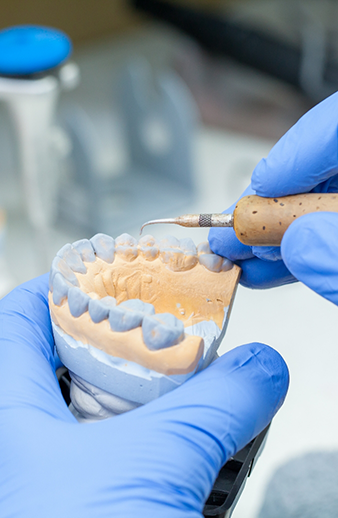
Dentures are made up of two different parts – the base of the denture and the artificial teeth. Here is what each of the parts consists of:
- Base: The base is the foundational structure of the replacement teeth. It can be made from a variety of different materials, including acrylic, nylon, porcelain, resin, or metal. Full dentures are usually made from acrylic because they can be tailored to match your natural gum tissue. Partial dentures may use metal clips with an acrylic base.
- Teeth: The replacement teeth are usually made from either resin or porcelain because of their natural appearance. However, porcelain is a more popular option for full dentures because it is more durable.
The Denture Creation Process
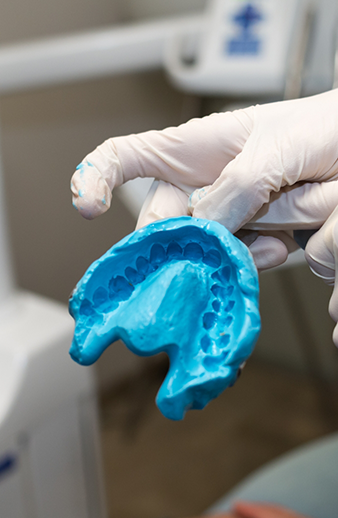
Each denture is custom-made for the patient’s mouth. This requires a multi-step process. Here is what this process typically looks like:
- First, your dentist will take impressions of the patient’s upper and lower gums. This will be used to make a plaster model that’s essentially a replica of the mouth. This is used to make sure the final denture is the right size and shape. Measurements of the jaw will also be taken.
- The model is then sent to the dental laboratory where the dentures are created. At the lab, they will make a wax version of the gumline.
- Replacement teeth are set in place. A mechanical device called an “articulator” will be used to attach the teeth with wax. Minor adjustments are made by shaping and carving the wax to ensure that it looks just like the gums. This wax base will be used for the finished dentures.
- The wax dentures are returned to the dental office for a fitting. If they are approved, they are sent back to the dental lab to complete the process.
- Once the dentures return to the lab, the technician will boil them to get rid of the wax portions. To do this, the dentures are placed in a flask or holding device. Plaster is poured in to maintain the shape of the dentures. Then, the entire flask is placed in hot water to melt the wax portions of the dentures away.
- Holes are made in the teeth so the material can attach to them. Next, a liquid separator is added to the plaster layer to stop the acrylic from sticking. Then acrylic is injected into the flask to replace the wax.
- The plaster is carefully removed using special lab tools to reveal the denture. Then, the dentures are placed in an ultrasonic bath to remove any remaining plaster.
- Any excess acrylic will be cut from the denture. After trimming, the denture will be polished to perfection.
- Now that they are ready, the patient can return to the dental office for a fitting. Adjustments will be made as needed to ensure everything is working properly and smoothly.
Adjusting to Your New Dentures
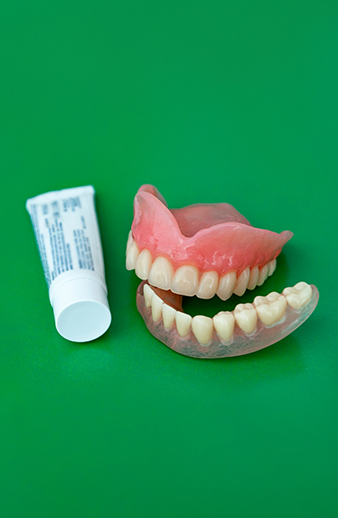
If your dentures don’t feel like your normal smile right away, this isn’t something to be worried about. It is perfectly normal for patients to experience minor discomfort when they first get new dentures. This can include soreness and difficulty speaking and eating. Fortunately, your mouth will adjust to your new smile, and they will become much more comfortable. To speed up the adjustment process, stick to soft foods at first, exercise your facial muscles, and consider using a denture adhesive. If your discomfort doesn’t seem to be going away, give us a call so we can help.
The Benefits of Dentures

If you weren’t aware, prolonged tooth loss is a tricky issue. It affects your looks and makes eating, speaking, and smiling harder. That said, you can trust dentures to solve this nasty problem. These prosthetics can restore your full grin, thus boosting your quality of life. As for the specific benefits of dentures, our office will happily tell you these details. Just keep reading, or call us directly to learn more!
Psychological Benefits

Losing one’s teeth is often hard to accept. After all, the resulting smile changes can make you anxious and insecure. It’s then easy to feel sad and struggle to socialize. In more extreme cases, the whole situation leads patients to suffer depression.
Of course, dentures would let you avoid this low mood. They’d restore your smile and your confidence alongside it. As such, you’d feel more at ease about your looks, speech, chewing ability, and so on.
Clearer Enunciation

When you lack teeth, speaking is quite a challenge. That’s only natural – your tongue relies on a full smile to position itself and form words. Therefore, losing some pearly whites can lead to speech impediments.
Luckily, dentures can fix this dilemma. They’d act as substitute teeth so your tongue can enunciate clearly. However, you’d need to adjust to the restorations first. A lot of practice goes into speaking naturally with dentures.
Improves Nutrition

As you’d expect, tooth loss leads to difficult meals. You need all your pearly whites to chew properly. Without the full set, you might skip tougher foods and restrict your diet. These changes would then result in malnutrition or indigestion.
Even here, though, dentures are a remedy. Their artificial teeth are durable, allowing you to chew food fairly well. As a result, they’d widen your dietary choices and boost your nutritional health.
Preserves Oral Health

Going without teeth harms more than your looks; the condition also harms oral health.
You see, so-called “smile gaps” damage your mouth. They serve as breeding grounds for harmful bacteria, raising your risk of gum disease and similar ailments. Adding insult to injury, they can make your remaining teeth tilt and fall out.
Thankfully, dentures stop these outcomes by filling the gaps. Doing so deprives bacteria of a space where they can multiply. Plus, closing the areas keeps other teeth from tilting and falling.
Expands Opportunities

Like most, you grasp that pretty teeth are vital to good first impressions. Having a nice smile puts others at ease and helps them enjoy conversations. So, it follows that a beautiful grin also expands your social and career opportunities. As others feel better around you, they’ll give you preferential treatment.
In truth, dentures can provide you with pretty pearly whites. They’d then strengthen your bond with friends, family, and co-workers. If you’re fortunate, the prosthetics could even lead to a promotion or a raise at work!
Understanding the Cost of Dentures
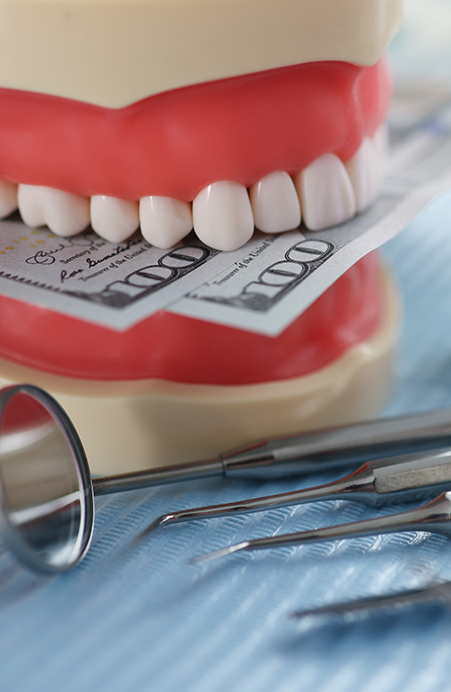
Every set of dentures is unique, which means the price that you’ll pay for them will likely vary from any other patient. No matter what your needs may be, Dr. Fisher Jr. will carefully evaluate your mouth, design a denture that looks natural and feels comfortable, and get you on the path toward a healthy smile and positive oral health.
Factors that Affect the Cost of Dentures
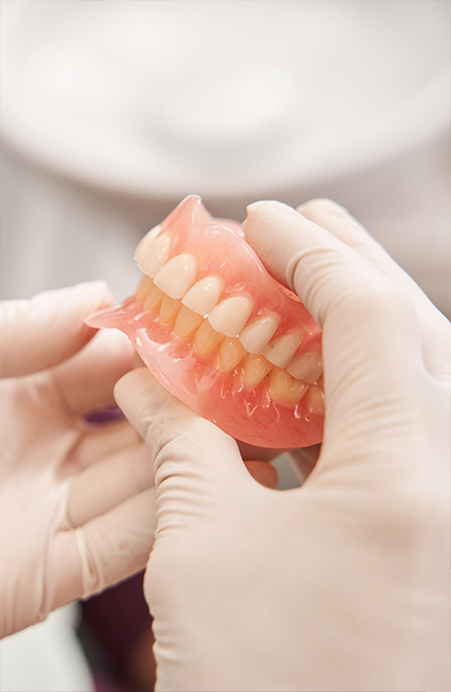
Dentures go through multiple phases to be completed, making them highly customized to the shape and size of your mouth. With that said, the factors that influence the final price tag of your treatment include the following:
- Whether preparatory treatments are needed to make room for the denture, such as tooth extractions.
- The type of acrylic that is utilized to fabricate the base of the denture, which is dyed to blend in with your current gum tissue and look natural.
- The materials used to create the replacement teeth (i.e. acrylic vs. porcelain)
You will likely not want to opt for the cheapest denture possible as it may not look as natural nor last as long as it could.
Are Implant Dentures More Expensive?
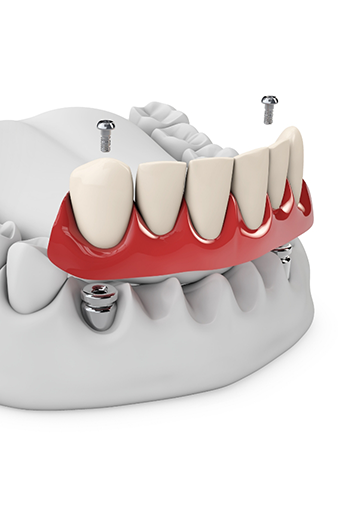
It’s true to say that implant dentures are generally more expensive because they require a series of dental implants and oral surgery to place. However, it’s also dental implants that distinguish traditional dentures from ones that provide superior comfort and longevity. On top of that, you can expect a denture that feels more lifelike and enables you to consume far more food. Considering implant dentures can last decades, and traditional dentures typically need to be replaced every 5 to 7 years, they are widely classified as a worthwhile investment.
Does Dental Insurance Cover Dentures?

Since dentures generally fall into the category of “major procedure,” that means they are usually covered around 50% by dental insurance. With that said, they are only likely to be covered and your plan’s coverage could vary. Our dental team will gladly confirm your benefits ahead of treatment so you can have confidence and expectations of what your out-of-pocket costs may include. We’ll also discuss the coverage for any related treatments necessary to place your denture.
Other Options for Making Dentures Affordable

Are you not currently enrolled in a dental insurance plan? Did your insurance not provide as much coverage as you thought it would? You can still make your treatments affordable when you sign up for financing options like CareCredit. This option allows you to make monthly installments on your treatment without having to break the bank. You can even pay for care with little to zero interest attached. If you’d like to learn more about financing your oral healthcare, please give our office a call and we’ll get you scheduled for a consultation with our team.
Dentures Aftercare

It’s important that when it comes to caring for your dentures, you follow the instructions provided by your dentist. These are designed to ensure that your new smile remains healthy and damage-free for as long as possible. Since these teeth are not meant to last forever, taking the time to keep them clean and safe will help you enjoy your smile and all the wonderful benefits it provides. Below are some of the most important tips to follow when it comes to dentures aftercare.
Removable Dentures
Removable dentures need to be carefully cleaned and cared for each day if they are to remain in the best possible shape. This can be accomplished with the following suggestions:
Remove After Eating
No matter the type of denture you have, you’ll need to remove them after eating. Bacteria and food particles can accumulate, resulting in poor oral health conditions, like gum disease and further tooth loss. Removing them after a meal will allow you to rinse them off and reduce the potential for any harmful build-up.
Clean Your Restoration
Dentures need to be cleaned twice a day (morning and evening) to remove dried saliva, bacteria, and any other particles that might try to wreak havoc on your gums and remaining smile. You can do this with a soft-bristled toothbrush, nonabrasive toothpaste, and lukewarm water. Using hot water can warp your dentures, causing them to no longer fit properly.
Keep Your Dentures Safe
Children and four-legged, furry friends can be a concern when living with dentures, which is why you’ll need to keep them safe by putting them out of reach of these lovable family members. If they get a hold of your teeth, you may never find them again. Also, when cleaning your dentures, make sure to protect them from possible damage by placing a towel or something soft in your sink. This can keep the material from cracking or breaking should they slip out of your hands.
Remove Dentures When You Sleep
After supporting your prosthetics all day, your gums and jawbone can use a break when bedtime arrives. This is why it’s important to soak your dentures overnight. Not only does this ensure they receive a more intricate cleaning, but your mouth no longer bears the pressure of your teeth, allowing it to rest. This practice also lowers the potential risk of pneumonia, which can occur if bacteria are allowed to accumulate beneath your denture over time.
Notice Changes
It is normal for there to be changes while wearing dentures. As the jawbone begins to shrink over time, your prosthetics will no longer fit comfortably. The moment you notice a change, do not wait to call our office to schedule an appointment with Dr. Fisher Jr. He will recommend either relining your teeth or creating a new denture depending on how long you’ve been wearing your current one.
All-On-4 Dentures
Although All-On-4 is different than traditional full or partial dentures, they still require regular cleaning and maintenance if you’re going to choose them to replace your missing teeth. These teeth are affixed to your implant posts that are positioned within the jawbone, but they can be cleaned with a soft-bristled toothbrush, nonabrasive toothpaste, dental floss, and alcohol-free mouthwash. Doing this twice a day as well as keeping up with regular dental checkups and cleanings will help your teeth remain healthy for decades.
Dentures FAQs
How Do I Care for My Dentures?
Every morning, you should brush your dentures (as well as your tongue, gums, and palate) with a soft-bristled toothbrush. Do not use toothpaste, as that could actually be abrasive to your dentures. At night, it’s usually best to remove your dentures and let them soak in a glass of either lukewarm (never hot) water or denture cleanser. This will not only clean your dentures but give your gums and jawbone a chance to rest from the pressure of holding your dentures in place all day.
Can I Eat Normally with Dentures?
Most patients need a little bit of time to get used to eating with dentures. You can start by cutting up your food into bite-sized chunks. Also, make sure to chew evenly on both sides of your mouth so as not to loosen your dentures. Over the next few weeks, gradually increase the size of your food until you can eat just like you did when you had all of your natural pearly whites.
Does It Hurt to Get Dentures?
When you’re first fitted with new dentures, there may be some minor soreness or irritation involved, especially if you recently got some teeth extracted or received implant dentures. However, this discomfort is temporary and should subside as your mouth gets used to your new teeth. This is why we highly recommend coming in to see us often throughout your healing process to adjust your dentures as needed, making them as comfortable as possible.
How Do I Know When It’s Time to Reline My Dentures?
If your dentures no longer fit as comfortably as they once did, it may be time for a procedure known as a “reline.” Although reline kits are often sold over the counter, it’s much better to visit us for a professional reline. Attempting to do it yourself may permanently damage your dentures. We can adjust your dentures to give you a much more comfortable and snug fit.
Will Dentures Change How I Speak?
First, it may require some practice to say certain sounds and words. This is because your mouth is still growing accustomed to the new appliance in it, and your tongue may get confused. Reading out loud and repeating words that give you problems can speed up this process. If your dentures “click” while talking, it may help to speak more slowly.

